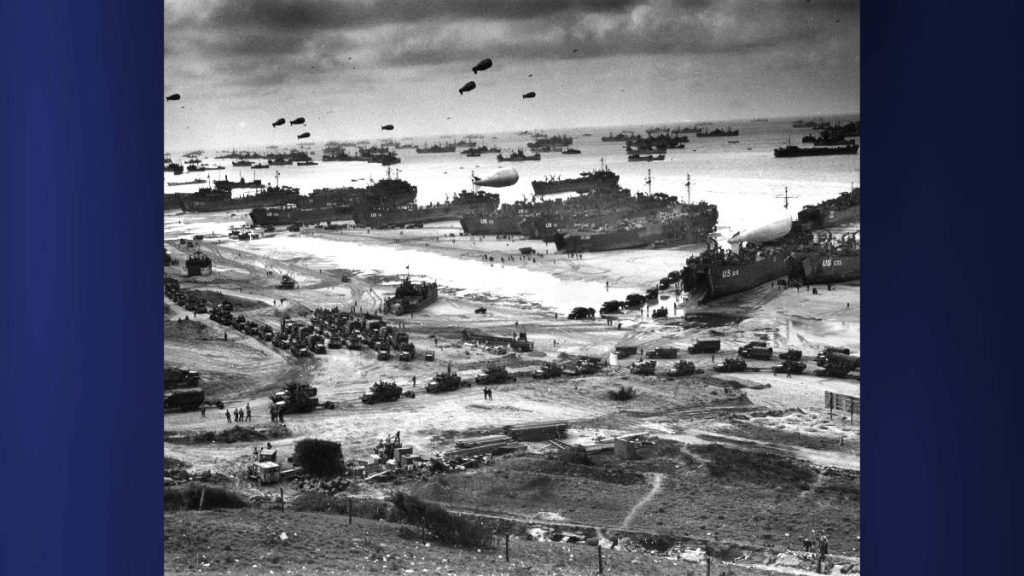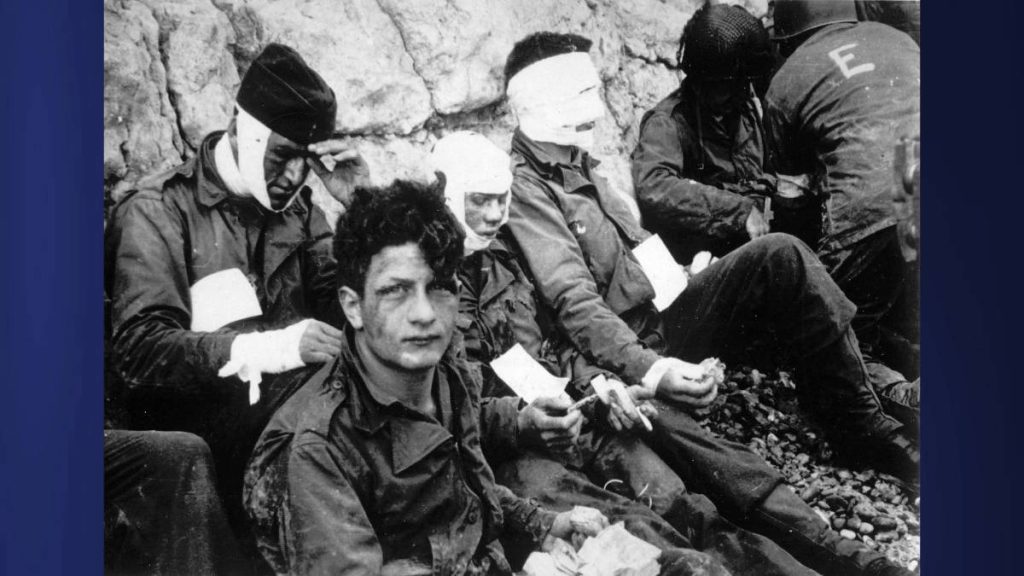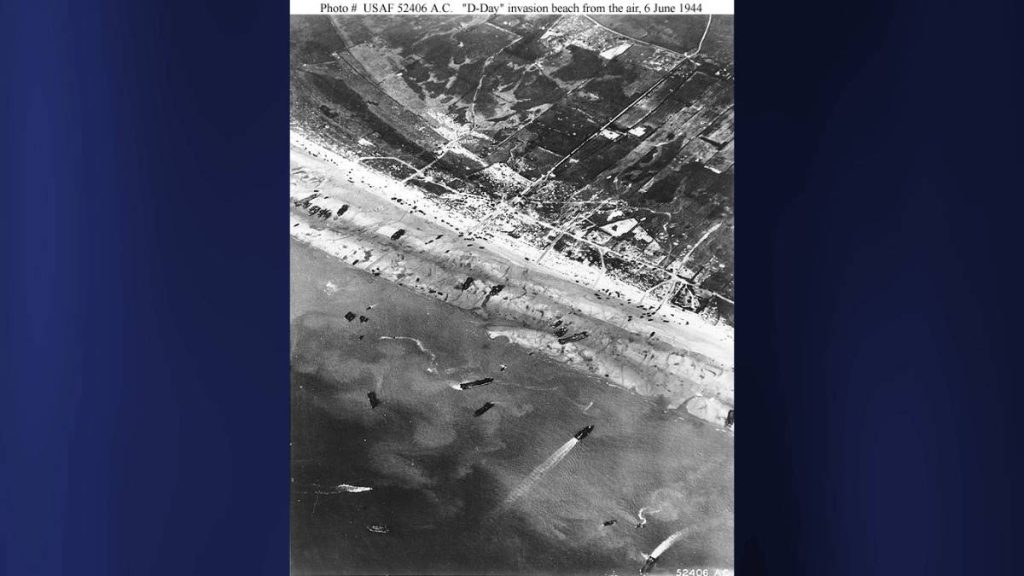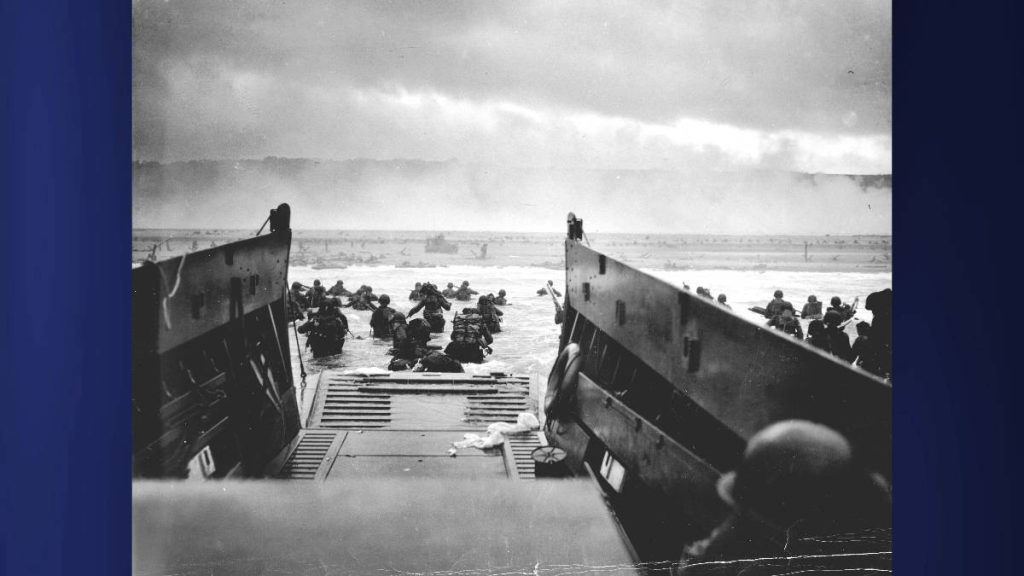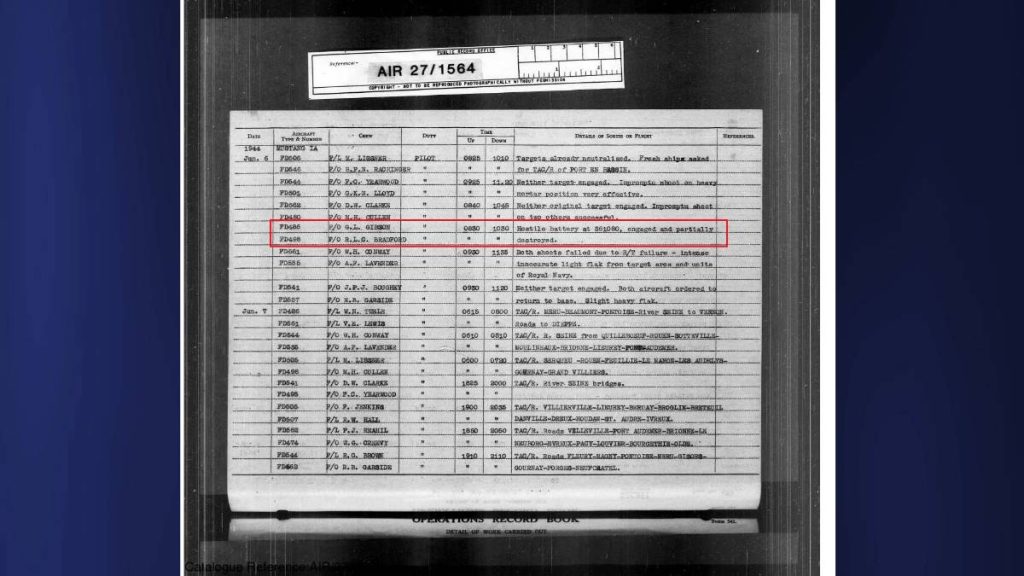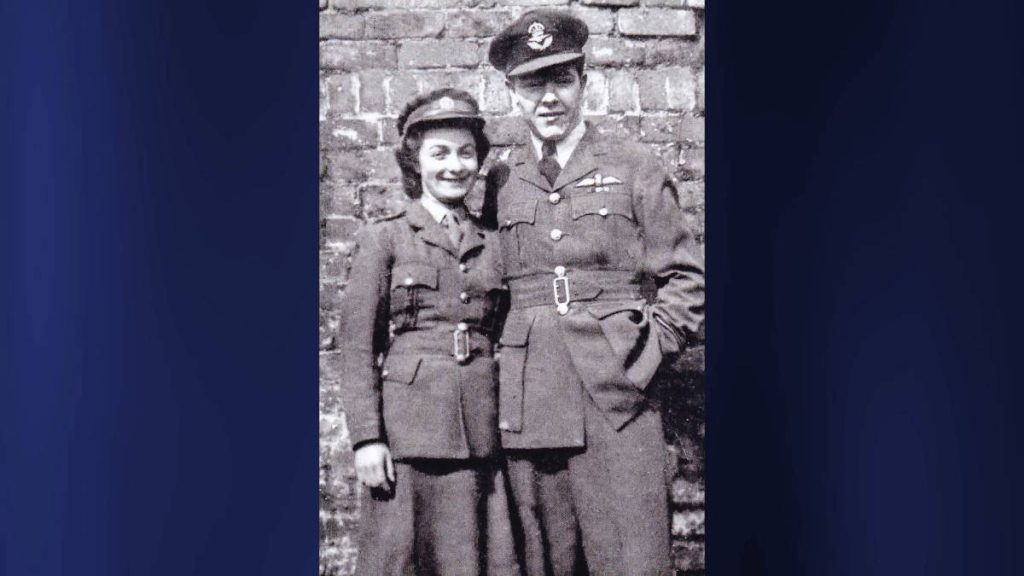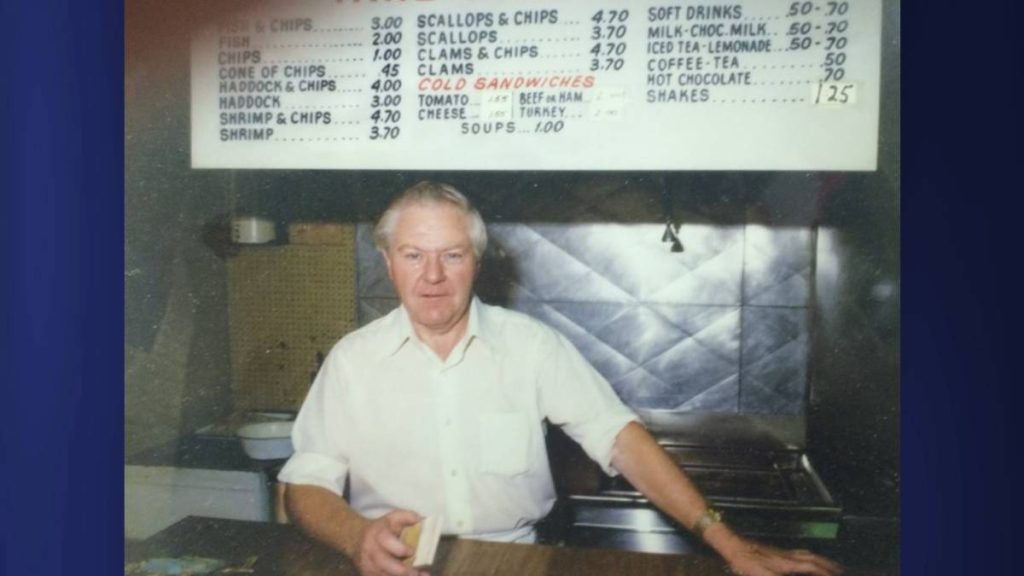‘Sky aglow with fire & death’ – Uncle of Kaua‘i man flew on D-Day 80 years ago, long-lost letter shows
“Hell on earth” raged 80 years ago this month – on a coastline a world away from the balmy beaches of Kaua‘i in the Hawaiian Islands.
June 6, 1944, was D-Day: The largest seaborne invasion in history and a profound turning point in World War II, during which 160,000 Allied troops crossed the English Channel to establish a successful foothold in Nazi-occupied France. It was a bloody beginning to a brutal march across Europe that ended in the destruction of Adolf Hitler’s Third Reich in May 1945.

Kaua‘i played its own role in World War II. B-17 Flying Fortresses stopped en route to the Battle of Midway and a Japanese fighter pilot crash-landed on nearby Ni‘ihau following the attack on Pearl Harbor. Yet the Garden Isle does bear a connection to D-Day as well – through Wailuā Homesteads man Robin Gibson, whose late father Danny and three uncles were veterans.
Danny died as a resident of Kaua‘i in the early 2000s, having never discussed his wartime career as an aircraft engineer based somewhere north of London. However, his older brother Gordon – also reticent in life – did leave a record of his own World War II experience, uncovered nearly a decade after his death in early 2006. It is a hand-written letter to Gordon’s British war bride Marjorie dated June 8, 1944, detailing still-fresh memories of his harrowing D-Day ordeal.
“It still sends chills up my back. For him, what a terrifying time it was,” Robin said of the letter, adding with a chuckle: “I’ve been in some hairy situations in my life, but I don’t think I’ve been anywhere near anything like that.”
Robin and his family revisit the precious document every June since its discovery in 2014, among a collection of love letters penned by Gordon and Marjorie during the first years of their relationship.
Gordon and Danny were Canadians born to an Irish immigrant father, a World War I veteran who named Gordon after a fellow stretcher bearer and brother-in-law killed near Vimy Ridge in France just two months before that war’s conclusion.
Nevertheless, Gordon and Danny joined their own generation’s global conflict sometime in the early 1940s and were soon shipped off to Great Britain, where Gordon entered the Royal Air Force as a reconnaissance pilot flying one of the most iconic fighter planes of the era: The North American P-51 Mustang.

“A nice word for spy,” Gordon’s son Kendall said of his father’s military position. “He always had cameras … His job was to take pictures and then get the hell back to England, so they could process whatever they were doing.”
Gordon’s missions did not always go to plan. Although “a very gentle man” according to Kendall, Gordon once bombed a German supply train, an action he was not proud of.
The reconnaissance pilot also clashed with enemy aircraft on at least one occasion, his Mustang’s engine likely straining as he hurtled across the atmosphere, locked in a dance of death somewhere above Europe.
Gordon never told his children about the dogfight. Kendall and his siblings only learned the truth when, at a young age, they discovered a roll of old film buried somewhere in their family home. Apparently, Gordon’s cameras had continued to roll throughout the skirmish.
“We actually found footage of aerial combat with my dad shooting,” Kendall recalled. “You can see the tracer shells.”
Gibson family lore also states Gordon undertook a secret mission to Germany in 1943, to scout a mansion Allied spies had determined was to be used as a meeting place by Hitler and other high-ranking Nazis.
“They wanted to get the layout of the house to see where would be the best place to attack it when the meeting took place,” Kendall said. “We’ve been told the meeting was canceled at the last moment … There was a great, big, long driveway with trees on both sides leading straight to the house like you’d see in a movie.
“He drove straight down the driveway at or below tree level with branches on both sides, taking pictures, and then flew off.”

But neither bombings, dogfights nor high-stakes espionage likely compared to the overwhelming realm of wholesale destruction Gordon entered in the predawn hours of June 6, 1944. He and his comrades in No. 268 Squadron RAF were ordered to fly their Mustangs above the 50-mile stretch of Normandy coast marked for the invasion codenamed Operation Overlord, providing naval gunnery spotting and direction to Allied warships offshore.
“In those days they did not have very accurate aiming. They had big guns, but that’s about it,” Kendall explained. “My dad’s job was to fly up and down the coast and radio to the ships, saying, ‘Aim a little bit further to your right’ and ‘200 yards further.’”
In his June 8 letter, 24-year-old Gordon described the scene to 19-year-old Marjorie, then about four-and-a-half months married and four months pregnant with their first child: “It’s a good job you didn’t know what was happening to your hubby that morning or you would have died in your bed.
“Never! – if I live to be 300 will I ever forget that 5 hours on Tuesday morning! Never have I seen! and never again will I see! such a magnificent achievement – such a show! – such a hell on earth! as I saw between 5 o’clock & 10 o’clock that morning,” Gordon continued, peppering his words with exclamation points. “Never again will I be so scared!!”
Gordon claimed No. 268 Squadron “knew nothing” of D-Day until the evening before, after which he went to bed – only to lie awake praying, thinking and shaking until called to action at 3 a.m.
“You’ve never seen ships until you’ve seen an invasion! I saw a thousand in 2 minutes! – hundred & hundreds! like little toys in a vast sea of dirty grey – all heading one way. The sky was filled with aircraft – literally thousands,” Gordon wrote.
About 12,000 Allied aircraft filled the skies that day, according to the National World War II Museum. Meanwhile, Gordon witnessed over 7,000 naval vessels – including 4,000 landing craft and 1,200 warships – in the water below him.
The 160,000 soldiers who slogged onto beaches codenamed Utah, Omaha, Gold, Juno and Sword hailed from the United States, the United Kingdom, Canada and 12 other Allied nations. They squared off against approximately 50,000 entrenched German troops.
“Hundreds of ship[s] were shelling the shore batteries with all they’d got … their shells rocked the coast like a tree in a hurricane,” Gordon reported in one of several lines featuring a vivid simile.
Within 20 minutes the coast was cloaked in smoke rising 4,000 feet into the air. Allied machine guns blazed “low crimson arcs” amidst “geysers of flame” as German antiaircraft units threatened to blow Gordon out of a “sky aglow with fire & death.”
“I felt sure that before another 5 minutes went by I’d be dead,” he continued. “I was sure of it! For the first few minutes I was absolutely overcome. I was stiff in the cockpit – I couldn’t speak a word over the radio!”
The Canadian RAF pilot eventually landed to refuel, spending 45 minutes on the ground before returning to “that awful hail of lead.” This jibes with an account of D-Day produced by No. 268 Squadron historian Colin Ford, which states the group later in the day sought out enemy reinforcements and units behind the Normandy beaches.
Gordon’s June 6 trial almost became a far longer ordeal when his engine stopped 6,000 feet above war-torn France. He prepared to crash-land. Then, at an elevation of 500 feet on his final approach to a nearby field, Gordon got the engine running.
“Somehow! – I can’t remember – I got back to England!! Never have I seen such a wonderful sight as the coast looked then!” he wrote.
About 4,414 Allied troops were killed on D-Day, with an additional 5,000 wounded, according to the Associated Press. It was a prelude to far greater slaughter, as 73,000 Allied forces were killed and 153,000 wounded in the ensuing Battle of Normandy. Around 20,000 French civilians were also killed.
Historians estimate between 4,000 and 9,000 German soldiers were killed, wounded or missing on D-Day.
No. 268 Squadron sustained just one recorded loss on D-Day, when a pilot returning to base due to aircraft engine trouble disappeared over the English Channel.
Gordon returned to Canada following the conclusion of the war with Marjorie and their burgeoning family, which would eventually grow to seven children, in tow.
After a brief stint as a farmer, Gordon joined the Royal Canadian Air Force to train a new generation of pilots, who flew jets rather than prop fighters like the Mustang. This new career sent the Gibsons to military bases across the world before a final return to Canada, where Gordon opened a fish-and-chips shop in Saskatoon, Saskatchewan.
“Mom always used to say, ‘Dad went from high flying to deep frying,’” Kendall said.
Robin spent a few summers as a teenager peeling potatoes in the rear of Gibson’s Fish & Chips, which remains open to this day.
“He was a kindhearted man. He took care of me,” Robin said. “He took me into his house and made me feel welcome.”
Marjorie – called “Lucky” by Gordon, who she in turn called “Gibby” – died nine years after her husband, on Jan. 1, 2015. Perhaps she remembered the final sentence of his D-Day letter:
“Gotta sign off now – my Darling – I love you – always & always – don’t ever forget that!”
- Full text of Gordon Gibson’s June 8, 1944 letter – transcribed by Kendall Gibson
- My Darling!
I suppose you are wondering what I saw the morning of the invasion. Well I can’t tell you what I was doing there but I think you can guess that. But I can tell that on the success of our efforts depended the lives of thousands of those boys down there in the landing craft. And I think we succeeded O.K. too.
It’s a good job you didn’t know what was happening to your hubby that morning or you would have died in your bed. Never! – if I live to be 300 will I ever forget that 5 hours on Tuesday morning! Never have I seen! and never again will I see! such a magnificent achievement – such a show! – such a hell on earth! as I saw between 5 o’clock & 10 o’clock that morning. Never again will I be so scared!!
We knew nothing about it until the evening before – when we were told the whole plan & our part in the actual landing operations. We were briefed that evening. I went to bed about 12 but I never slept a wink – I just lay there & thought & prayed & shook. I think everyone did. We were called at 3 a.m. Had breakfast & we were in the air at 5am.
It was dark as pitch when we took off & low cloud about 1000 feet & raining like a son-of-a-gun. I was leading green section. We climbed up through the first layer of muck & set course for the E. Coast where we had to set course for our target areas. The moon was shining here & there through huge mountains of cloud. I couldn’t see the ground at all. I steered my course as best I could to a degree & to a few seconds of time. I left in cloudy England & headed south for France.
It was still raining – we lit down to 2000 & came out into a clearer area & we could see the sea below. You’ve never seen ships until you’ve seen an invasion! I saw a thousand in 2 minutes! – hundred & hundreds! like little toys in a vast sea of dirty grey – all heading one way. The sky was filled with aircraft – literally thousands.
We kept on – in a few minutes I could discern the gun flashes 50 miles ahead. Like little fireflies flickering in the twilight. In a matter of minutes we were right in the thick of it. It was soul shaking. The battle was just beginning. Hundreds of ship were shelling the shore batteries with all they’d got! – and more! Their gun flashes lit up the sky over the sea! – their shells rocked the coast like a tree in a hurricane. Pill boxes, shore guns, block houses went up in the air in dust like shovel fulls of sand.
In 30 minutes all hell broke loose on the coast. Thousands of bombers poured down a devastating rain of bombs in patterns – carpeting whole towns – roads – bridges –german emplacements! Villages & towns went up to 500 feet in dust – the bomb flashes rose to 1000 feet – a vivid yellowish – red flame of death! Everything was on fire! Towns, woods! – the whole coast line in 20 minutes was covered in the smoke of battle to 4000 feet! Petrol & ammo dumps blew sky high – sporting geysers of flame & billows of smoke like huge thunder clouds! The thousands of men came up in the landing barges their machine guns blazing low crimson arcs towards the shore – ! shells fell in the water all around – the german gunners on shore were trying desperately to stem the terrific over-whelm-ing flood that was overtaking them! The sky was absolutely filled with flack. Five minutes after I was in it – I felt sure that before another 5 minutes went by I’d be dead. I was sure of it! For the first few minutes I was absolutely overcome. I was stiff in the cockpit – I couldn’t speak a word over the radio! To me there was only one place where there wasn’t any flack & that’s where my aircraft was. But somehow when we’d finished our task for that trip we were all still intact. I don’t know how on earth Roy ever stayed with me! I could hardly see my targets at times! The whole area was covered in a pall of yellow-black smoke. The sky was aglow with fire & death. We got out & we flew back to our advanced base – refueled & 45 minutes later we were off again and again we were in that awful hail of lead. But if it was bad for us – it must have been terrific for the Jerries & for the boys down there in the barges.
And now my little gal – during the next 30 minutes is where you almost “had” your husband! At 6000 feet among all the confusion my engine stopped – of all places! I called up my #2 & told him to take over & finish the job – that I was going to have to crash–land in France. I picked a field & prepared myself for the bang! Why the Jerries never shot me to smithereens I dunno – I was a sitting target! By a stroke of luck or by the hand of God or something; on my last approach to the field at 500 feet I got the engine running – roughly – but running! Somehow! – I can’t remember – I got back to England!! Never have I seen such a wonderful sight as the coast looked then!
I got back to home base about noon & I wrote a short note to you & I went to bed. I was dead – tired – my eyes ached like fire – I was played right out!
I have seen a bit of fightin’ – but never have I seen such a sight as Tuesday morning! – such an achievement – such a success! – against such odds! It was absolutely magnificent.
Someday – the people of the world will find out what has taken place really in that invasion & what will be taking place during the next few weeks. It is absolutely astounding! – I doubt if even when they know – if they’ll believe it!
It was a wonderful show – I wouldn’t have missed it for anything. I am proud I was able to do my little wee bit to help it start on it’s way. If you wamta know the future honey – just put me to sleep & I’ll tell yuh – huh?!
They tell me this evening that they are making arrangements for 2 of us to have a day off per day – so that’ll give me a chance one of these nights to get me some sleep – perhaps. It’s a very wet night out to-nite – I forget whether you said you’d be calling or not to-nite.
Anyway I’ll be in if you do.
Gotta sign off now – my Darling – I love you – always & always – don’t ever forget that!
Always — Your Gibby XXXXXXX
- My Darling!



